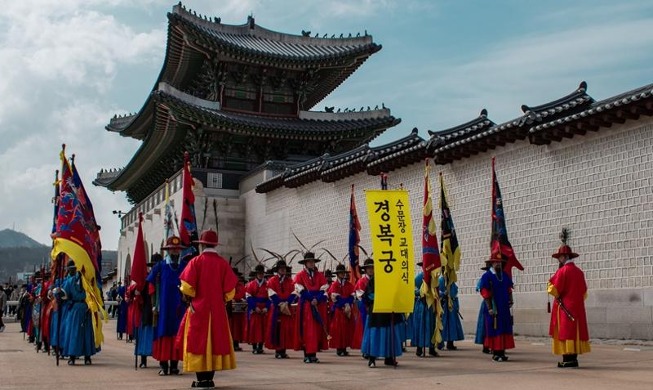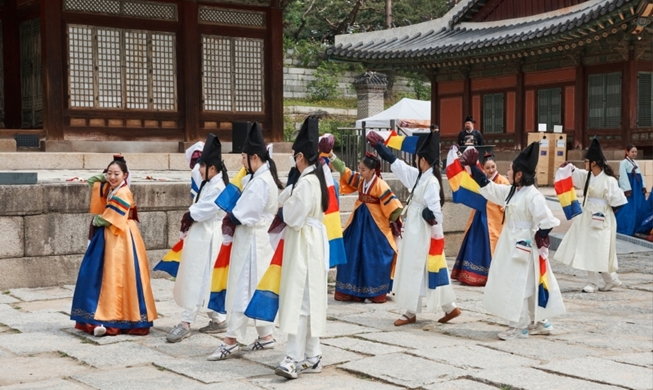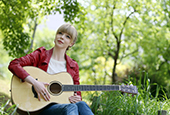-
 Korea.net's 24-hour YouTube channel
Korea.net's 24-hour YouTube channel- NEWS FOCUS
- ABOUT KOREA
- EVENTS
- RESOURCES
- GOVERNMENT
- ABOUT US
A six-member chorus, Felice Singers, composed of professionally trained male opera singers recently released an album of trot music, causing a sensation across the musical scene here.
The album contains two songs, "Snowflake Ice" and "Triple Time," which are sung in deep masculine and clear voices, and both are traditional trot melodies. These songs make you feel cheerful and excited upon listening to them.
The chorus consists of opera singers in their 30s and 40s. They sang the two songs with an easy melody and jaunty rhythms. "Snowflake Ice Cake" tells a love story, while "Triple Time" is about the joy and sorrow of middle-aged fathers. The lyrics to "Triple Time" go like this.
"Empty wallet feels so heavy/ I thought it would be the end of this difficult time after overcoming and going through this once/ It is dumbfounding. I live like everybody else/ Why do only I have to face hardship again?" The heartbreaking lyrics have taken middle-aged male fans by storm.
The opera singers all graduated from prestigious music schools in Korea and studied abroad in many countries, including Italy, Germany and the Netherlands. They have also had years of experience on the opera stage in those countries. In December 2013, Park Joon-seok, the leader of the sextet and a tenor, formed the chorus with five younger singers: baritone Kwak Sang-hun, bass Kim Se-whan and tenors Kang Dae-joon, Pack Kwang-ho and Oh Kyoung-keun. "Felice" means, "happy," in Italian and they named the chorus the Felice Singers because they wanted to breathe in happiness and share it with the audience.
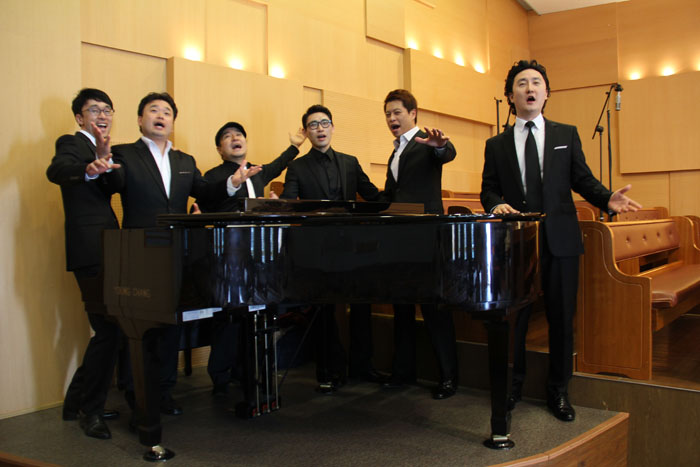
"We started to sing trot because we wanted to get closer to our audience," said Park Joon-seok, the chorus' leader. "In the beginning, we sang songs from musicals. One day, though, we tried Korean pop songs and trot and it was very well received."
"If we just kept focusing on classical music, we would have fewer opportunities in terms of performances. We wanted to have a broader audience and so we started to sing trot. We want to deliver a message of hope," he added.
Korea.net recently sat down with the Felice Singers and talked about the release of their new trot album.
How did you form the Felice Singers?
- Park Joon-seok: As opera singers, we wanted to perform great music together. Initially, we sang songs from musicals and Korean lyrical songs, but we wanted to get closer to our audience and so we started to sing trot music. We sang Korean pop songs with trot-like melodies. It's not easy for classically trained musicians to accept such a thing, but we all agreed to it.
Pack Kwang-ho: We wanted to have our own songs. Normally, Korean lyrical songs and classical music are at least decades old, but we wanted to compose and sing our own music. If we were to make Korean lyrical songs, however, it would be unfamiliar to most people, so we decided to try something more popular. We chose trot because it is easy to deliver our emotion and we thought it fits with our age. We made the decision around March and released the album in July.
- Why did you opera singers try trot?
- Park Joon-seok: We wanted to get closer to our audience. Classical music has a very narrow fan base and it is not very popular. We thought it would be better for us to sing trot rather than ballads because of our age. We wanted our audience to have fun.
Kim Se-whan: Korean lyrical songs, like classical music, have not been very popular. There used to be a TV program featuring Korean lyrical songs, but now there are few Korean lyrical song performances. When we hold a Korean lyrical song performance, the fans who come to see our show are usually classical music fans, not popular music fans. If a popular singer sings a Korean lyrical song, it would be popular. There is no difference. It really depends on who sings the songs.
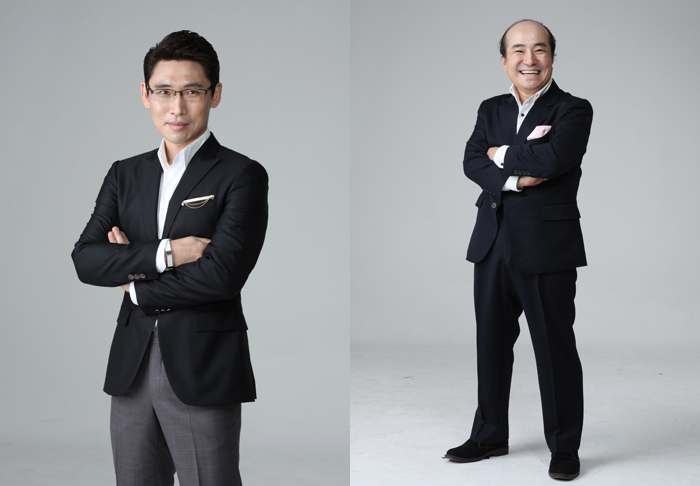
- You once said you tried trot with a sense of desperateness. What did you mean?
Park Joon-seok: We are all bread-earners and need to continue to meet new audiences to make a living. It is better for us to hold as many performances as we can. We thought about what kind of songs in which the audience would be more interested. If we perform only classical music, there are only a small number of chances to perform. There are numerous opera singers produced every day, but there are not enough theaters and opportunities where we can sing. Most theaters want younger singers. As we get older, into our 30s, 40s and 50s, there will be fewer chances to perform. At our age, we need to make our decision. It is hard to make a living unless you, as an opera singer, are a permanent member of some institution.
Pack Kwang-ho: If we were to focus solely on classical music, it would have been difficult for us to make a living. Luckily, I was able to do so by just doing performances and giving lessons, but there are many opera singers who studied abroad and now have second jobs such as insurance salesmen. There are not many opportunities for classical music performances in Korea.
- Opera singing and trot are completely different genres. Was it difficult to sing trot?
- No, it was not very difficult. We did not sing the songs in a trot style. The songs have trot-like melodies, but they are relatively closer to classical music. If we were singing solo, we would have to have had sung in a trot style, but since we are a sextet, we sing it like we are singing opera songs. They are exciting songs and we sing them like rock ‘n' roll. People like our songs because we -- six members -- sing them together and they are full of energy. They say the songs are exciting and cheerful. If a professional trot singer sings it, it would have sounded like trot, but if somebody else sings, it sounds totally different.
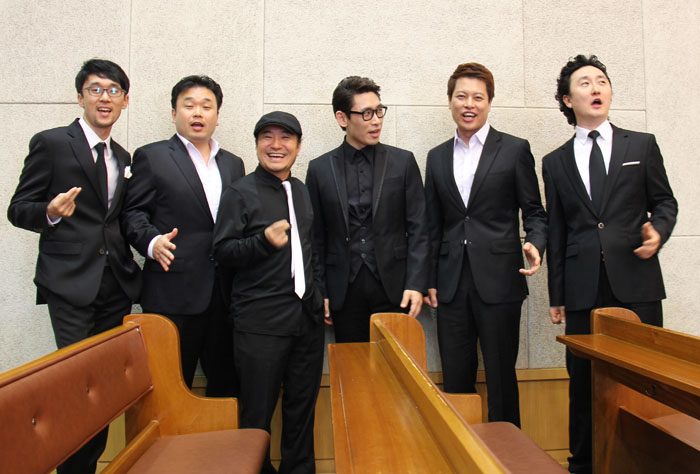
- There are prejudices against trot. It must have been difficult. How did you overcome these?
- Kwak Sang-hun: Some said, "it is unexpected," and even asked, "Why?" When we released our album and appeared on TV to perform our songs, people liked them very much. Last week, when I met with my teacher, he asked me why on earth an opera singer started to sing trot. My teacher must have felt sad about it. It would have been okay if I went as far as to sing ballads, but it must have been hard to accept that I ever sang trot. He, as a classical musician, must have thought it regrettable.
Kim Se-whan: Some people think we studied classical music, something higher class, and ask why do something that is lower class. In Germany, however, there is a folk music program on TV and a senior opera singer presides over the show.
Kwak Sang-hun: I believe it is the result of our education. In some sense, we are the first to try this, and are pioneers. There are both worries and encouragements because we are trying this for the first time. We are afraid because it is a new start.
Pack Kwang-ho: Regardless of success or failure, I am glad that we can pursue both classical music and popular music at the same time. We haven't given much thought to that when we started. If we succeed, others will follow. I hope this will be a breakthrough.
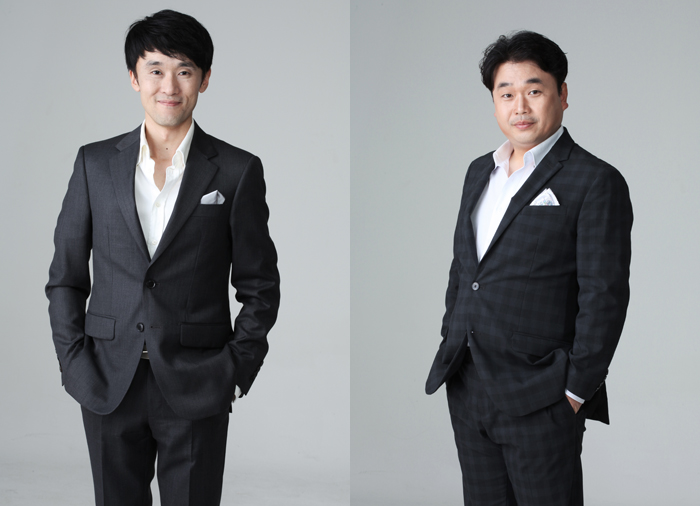
- What is attractive about trot?
- Park Joon-seok: People can sing and feel it easily and it is fun to sing. It is familiar and the lyrics are sincere. Unlike opera songs, the lyrics are made up of Korean words and it's easy to communicate and very direct. Lyrics in an opera are often based on metaphors.
Pack Kwang-ho: Most of all, it is easy to communicate. If people suddenly seek out our songs, it would be a huge success for us as artists. No matter how often we sing, if there is no audience, it would be of no use. Even in Western history, popular music was born during the Renaissance.
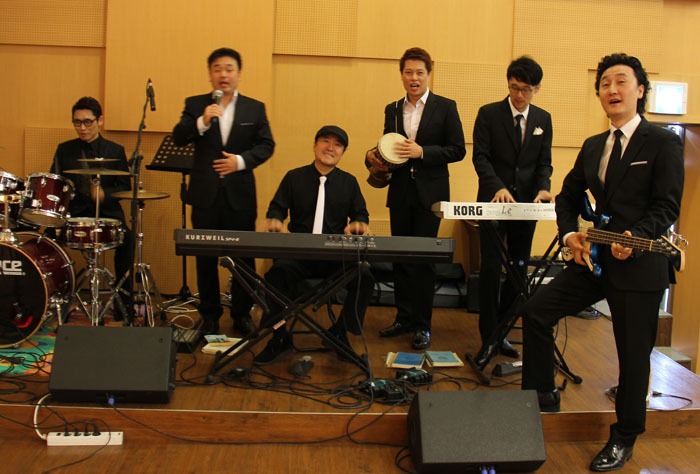
- In our society, trot is a popular genre, while classical music is something more elegant. What do you think?
- Kwak Sang-hun: That is because of our historical background. Classical music was once popular music, but classical music was produced hundreds of years ago. Now, it is not up to date. We chose a popular music for our time, trot.
Trot can be noble, too. In particular, when a master singer sings it, it sounds magnificent. When there was a concert to commemorate the late popular music composer Gil Ok-yun, Lee Mi-ja and Patti Kim sang songs by Gil. They were old, but their singing was nearly perfect. I almost shed tears. It is the power of music, regardless of genre. We cannot say this is noble and the other is not.
- Do you intend to pursue crossover music?
- Park Joon-seok: That is our goal. It can be trot, Korean pop or easy-listening Korean lyrical songs. We are not just focusing on trot. We will continue to perform and to broaden our sphere. We were actually asked to sing songs that won awards at past university music festivals. Our audience wants us to sing songs that were loved in the past. I think we are going to sing a lot of Korean pop songs.
Kwak Sang-hun: We are not just singing Korean pop songs, but we are pursuing something new, more classical pop songs. Our repertoire will become richer. We will reinterpret music.
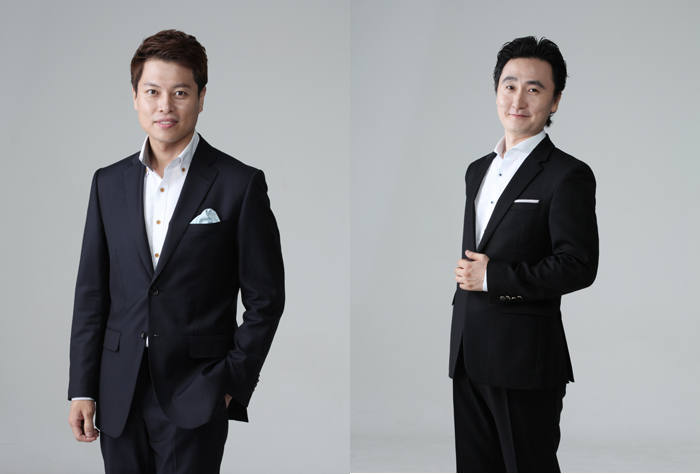
- How do you want to communicate with your fans using trot? What kind of message do you want to deliver?
Park Joon-seok: I want to deliver a message of hope. It is not easy to make a living and we want to sing songs that can give people joy and comfort. The fact we, as middle-aged men, are trying something new, can encourage other people.
Pack Kwang-ho: We want to boost the morale of husbands across the country. Fathers of our age face difficult times and seldom have the chance to laugh, but as in the song "Triple Time," we intend to give some encouragement to them.
- How do you want to be remembered as musicians?
Oh Kyoung-keun: I want to hear people say they feel happy when they listen to our songs. If we can make people nowadays happy, that would be the biggest honor for us.
Pack Kwang-ho: When I was very young, I saw on TV a gray-haired man holding the hand of his grandson and laying flowers at Elvis Presley's tomb. I believe the old man was an Elvis fan. I want to be remembered as a musician and give people pleasant memories. I want to be a musician who can make people recall good things with our songs.
By Limb Jae-un
Korea.net Staff Writer
Photos: Limb Jae-un, Sinnan Entertainment
jun2@korea.kr
The album contains two songs, "Snowflake Ice" and "Triple Time," which are sung in deep masculine and clear voices, and both are traditional trot melodies. These songs make you feel cheerful and excited upon listening to them.
The chorus consists of opera singers in their 30s and 40s. They sang the two songs with an easy melody and jaunty rhythms. "Snowflake Ice Cake" tells a love story, while "Triple Time" is about the joy and sorrow of middle-aged fathers. The lyrics to "Triple Time" go like this.
"Empty wallet feels so heavy/ I thought it would be the end of this difficult time after overcoming and going through this once/ It is dumbfounding. I live like everybody else/ Why do only I have to face hardship again?" The heartbreaking lyrics have taken middle-aged male fans by storm.
The opera singers all graduated from prestigious music schools in Korea and studied abroad in many countries, including Italy, Germany and the Netherlands. They have also had years of experience on the opera stage in those countries. In December 2013, Park Joon-seok, the leader of the sextet and a tenor, formed the chorus with five younger singers: baritone Kwak Sang-hun, bass Kim Se-whan and tenors Kang Dae-joon, Pack Kwang-ho and Oh Kyoung-keun. "Felice" means, "happy," in Italian and they named the chorus the Felice Singers because they wanted to breathe in happiness and share it with the audience.

The Felice Singers, a chorus of six opera singers, says it sings trot in order to reach a broader audience.
"We started to sing trot because we wanted to get closer to our audience," said Park Joon-seok, the chorus' leader. "In the beginning, we sang songs from musicals. One day, though, we tried Korean pop songs and trot and it was very well received."
"If we just kept focusing on classical music, we would have fewer opportunities in terms of performances. We wanted to have a broader audience and so we started to sing trot. We want to deliver a message of hope," he added.
Korea.net recently sat down with the Felice Singers and talked about the release of their new trot album.
How did you form the Felice Singers?
- Park Joon-seok: As opera singers, we wanted to perform great music together. Initially, we sang songs from musicals and Korean lyrical songs, but we wanted to get closer to our audience and so we started to sing trot music. We sang Korean pop songs with trot-like melodies. It's not easy for classically trained musicians to accept such a thing, but we all agreed to it.
Pack Kwang-ho: We wanted to have our own songs. Normally, Korean lyrical songs and classical music are at least decades old, but we wanted to compose and sing our own music. If we were to make Korean lyrical songs, however, it would be unfamiliar to most people, so we decided to try something more popular. We chose trot because it is easy to deliver our emotion and we thought it fits with our age. We made the decision around March and released the album in July.
- Why did you opera singers try trot?
- Park Joon-seok: We wanted to get closer to our audience. Classical music has a very narrow fan base and it is not very popular. We thought it would be better for us to sing trot rather than ballads because of our age. We wanted our audience to have fun.
Kim Se-whan: Korean lyrical songs, like classical music, have not been very popular. There used to be a TV program featuring Korean lyrical songs, but now there are few Korean lyrical song performances. When we hold a Korean lyrical song performance, the fans who come to see our show are usually classical music fans, not popular music fans. If a popular singer sings a Korean lyrical song, it would be popular. There is no difference. It really depends on who sings the songs.

Kang Dae-joon (left) and Park Joon-seok of the Felice Singers.
- You once said you tried trot with a sense of desperateness. What did you mean?
Park Joon-seok: We are all bread-earners and need to continue to meet new audiences to make a living. It is better for us to hold as many performances as we can. We thought about what kind of songs in which the audience would be more interested. If we perform only classical music, there are only a small number of chances to perform. There are numerous opera singers produced every day, but there are not enough theaters and opportunities where we can sing. Most theaters want younger singers. As we get older, into our 30s, 40s and 50s, there will be fewer chances to perform. At our age, we need to make our decision. It is hard to make a living unless you, as an opera singer, are a permanent member of some institution.
Pack Kwang-ho: If we were to focus solely on classical music, it would have been difficult for us to make a living. Luckily, I was able to do so by just doing performances and giving lessons, but there are many opera singers who studied abroad and now have second jobs such as insurance salesmen. There are not many opportunities for classical music performances in Korea.
- Opera singing and trot are completely different genres. Was it difficult to sing trot?
- No, it was not very difficult. We did not sing the songs in a trot style. The songs have trot-like melodies, but they are relatively closer to classical music. If we were singing solo, we would have to have had sung in a trot style, but since we are a sextet, we sing it like we are singing opera songs. They are exciting songs and we sing them like rock ‘n' roll. People like our songs because we -- six members -- sing them together and they are full of energy. They say the songs are exciting and cheerful. If a professional trot singer sings it, it would have sounded like trot, but if somebody else sings, it sounds totally different.

The Felice Singers say trot is fun and cheerful to sing, and they sing it like they sing opera songs.
- There are prejudices against trot. It must have been difficult. How did you overcome these?
- Kwak Sang-hun: Some said, "it is unexpected," and even asked, "Why?" When we released our album and appeared on TV to perform our songs, people liked them very much. Last week, when I met with my teacher, he asked me why on earth an opera singer started to sing trot. My teacher must have felt sad about it. It would have been okay if I went as far as to sing ballads, but it must have been hard to accept that I ever sang trot. He, as a classical musician, must have thought it regrettable.
Kim Se-whan: Some people think we studied classical music, something higher class, and ask why do something that is lower class. In Germany, however, there is a folk music program on TV and a senior opera singer presides over the show.
Kwak Sang-hun: I believe it is the result of our education. In some sense, we are the first to try this, and are pioneers. There are both worries and encouragements because we are trying this for the first time. We are afraid because it is a new start.
Pack Kwang-ho: Regardless of success or failure, I am glad that we can pursue both classical music and popular music at the same time. We haven't given much thought to that when we started. If we succeed, others will follow. I hope this will be a breakthrough.

Pack Kwang-ho (left), Oh Kyoung-keun
- What is attractive about trot?
- Park Joon-seok: People can sing and feel it easily and it is fun to sing. It is familiar and the lyrics are sincere. Unlike opera songs, the lyrics are made up of Korean words and it's easy to communicate and very direct. Lyrics in an opera are often based on metaphors.
Pack Kwang-ho: Most of all, it is easy to communicate. If people suddenly seek out our songs, it would be a huge success for us as artists. No matter how often we sing, if there is no audience, it would be of no use. Even in Western history, popular music was born during the Renaissance.

The Felice Singers say that classical music was once a popular music and that trot is the popular music of our time.
- In our society, trot is a popular genre, while classical music is something more elegant. What do you think?
- Kwak Sang-hun: That is because of our historical background. Classical music was once popular music, but classical music was produced hundreds of years ago. Now, it is not up to date. We chose a popular music for our time, trot.
Trot can be noble, too. In particular, when a master singer sings it, it sounds magnificent. When there was a concert to commemorate the late popular music composer Gil Ok-yun, Lee Mi-ja and Patti Kim sang songs by Gil. They were old, but their singing was nearly perfect. I almost shed tears. It is the power of music, regardless of genre. We cannot say this is noble and the other is not.
- Do you intend to pursue crossover music?
- Park Joon-seok: That is our goal. It can be trot, Korean pop or easy-listening Korean lyrical songs. We are not just focusing on trot. We will continue to perform and to broaden our sphere. We were actually asked to sing songs that won awards at past university music festivals. Our audience wants us to sing songs that were loved in the past. I think we are going to sing a lot of Korean pop songs.
Kwak Sang-hun: We are not just singing Korean pop songs, but we are pursuing something new, more classical pop songs. Our repertoire will become richer. We will reinterpret music.

Kwak Sang-hun (left), Kim Se-whan
- How do you want to communicate with your fans using trot? What kind of message do you want to deliver?
Park Joon-seok: I want to deliver a message of hope. It is not easy to make a living and we want to sing songs that can give people joy and comfort. The fact we, as middle-aged men, are trying something new, can encourage other people.
Pack Kwang-ho: We want to boost the morale of husbands across the country. Fathers of our age face difficult times and seldom have the chance to laugh, but as in the song "Triple Time," we intend to give some encouragement to them.
- How do you want to be remembered as musicians?
Oh Kyoung-keun: I want to hear people say they feel happy when they listen to our songs. If we can make people nowadays happy, that would be the biggest honor for us.
Pack Kwang-ho: When I was very young, I saw on TV a gray-haired man holding the hand of his grandson and laying flowers at Elvis Presley's tomb. I believe the old man was an Elvis fan. I want to be remembered as a musician and give people pleasant memories. I want to be a musician who can make people recall good things with our songs.
By Limb Jae-un
Korea.net Staff Writer
Photos: Limb Jae-un, Sinnan Entertainment
jun2@korea.kr




